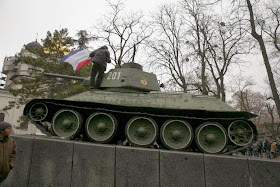Nearly 20 years after a triumphant Tony Blair overlooked the Thames to declare ‘a new dawn has broken, has it not?’, Britain has woken up to an entirely different sunrise. Using the EU referendum like a deafening alarm clock, the voters have startled their rulers with a nerve-shredding jolt. The markets are threatening freefall, the pound has plunged and all our party leaders - apart from one - are in shock.
For the Leave vote, as narrow as it was, is a genuinely generational shift in British politics and the UK’s role in the world. Bigger than any general election, even bigger than that famous Blair landslide that ushered in 13 years of Labour rule, or Thatcher’s own era-defining election successes, the referendum has pivoted us away from the European Union and into an uncertain direction. Even those who wanted Brexit are struggling to work out just what it will look like.
The very existence of the United Kingdom is now in question. Scots may well use their own Remain result to inevitably prepare their own independence referendum. Sinn Fein has come out to call for a referendum on Irish reunification, as it seems Ulster’s two communities voted differently.
There are many reasons for the Leave victory and it would be folly to presume which was foremost. Was this a howl of pain from those neglected for years by Westminster? Was it a cry for help from those left behind by globalisation? Was it a rebel yell for freedom from Brussels? Was it a protest at the the Government? It was probably all four.
But I suspect that another key driver was English (and Welsh) national pride. Having seen the Scots come close to a breakaway, and the new politics they won as a result, voters seemed to be telling London that EU migrants have had all the rights and it was time for some of their own. From Sunderland to Sheffield, from Swansea to Southampton, they voted in unprecedented numbers.
And ultimately, all the ‘experts’ in the City, the polling firms, the betting markets - and yes the media - had missed the rumble in the tectonic plates of our political system. In the end it may have come down to this: force the British working classes (and ‘‘Middle Britain’) to make a straight, binary choice between their country and the EU and they will pick their home turf every time. David Cameron may argue that wasn’t the choice on the ballot paper, but many voters may well have felt that was the choice on offer. And they finally had a reason to vote for something for the first time in decades.
Nigel Farage, who along with Boris Johnson should take most credit for the result, famously said ‘I want my country back’. And after an extraordinary night, it seems 17 million Britons agreed with him. For the other 16 million who didn’t agree, it may be a long, long time before they get their own country back, if ever.
A new dawn has indeed broken. We wait to see whether our nation has too.
For the Leave vote, as narrow as it was, is a genuinely generational shift in British politics and the UK’s role in the world. Bigger than any general election, even bigger than that famous Blair landslide that ushered in 13 years of Labour rule, or Thatcher’s own era-defining election successes, the referendum has pivoted us away from the European Union and into an uncertain direction. Even those who wanted Brexit are struggling to work out just what it will look like.
The very existence of the United Kingdom is now in question. Scots may well use their own Remain result to inevitably prepare their own independence referendum. Sinn Fein has come out to call for a referendum on Irish reunification, as it seems Ulster’s two communities voted differently.
There are many reasons for the Leave victory and it would be folly to presume which was foremost. Was this a howl of pain from those neglected for years by Westminster? Was it a cry for help from those left behind by globalisation? Was it a rebel yell for freedom from Brussels? Was it a protest at the the Government? It was probably all four.
But I suspect that another key driver was English (and Welsh) national pride. Having seen the Scots come close to a breakaway, and the new politics they won as a result, voters seemed to be telling London that EU migrants have had all the rights and it was time for some of their own. From Sunderland to Sheffield, from Swansea to Southampton, they voted in unprecedented numbers.
And ultimately, all the ‘experts’ in the City, the polling firms, the betting markets - and yes the media - had missed the rumble in the tectonic plates of our political system. In the end it may have come down to this: force the British working classes (and ‘‘Middle Britain’) to make a straight, binary choice between their country and the EU and they will pick their home turf every time. David Cameron may argue that wasn’t the choice on the ballot paper, but many voters may well have felt that was the choice on offer. And they finally had a reason to vote for something for the first time in decades.
Nigel Farage, who along with Boris Johnson should take most credit for the result, famously said ‘I want my country back’. And after an extraordinary night, it seems 17 million Britons agreed with him. For the other 16 million who didn’t agree, it may be a long, long time before they get their own country back, if ever.
A new dawn has indeed broken. We wait to see whether our nation has too.


















































































































































































No comments:
Post a Comment